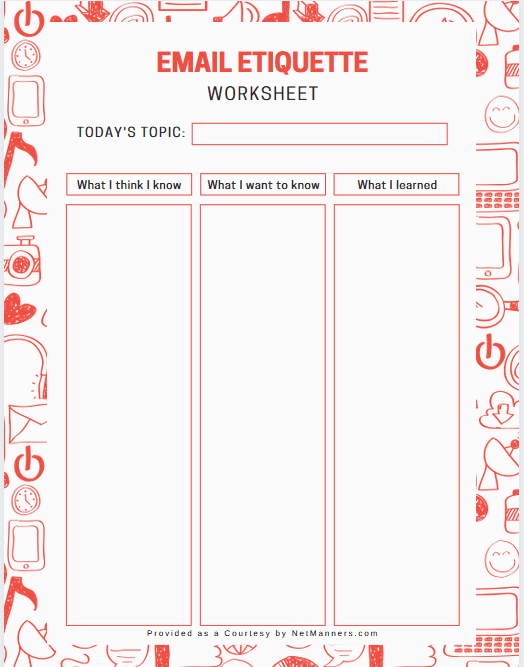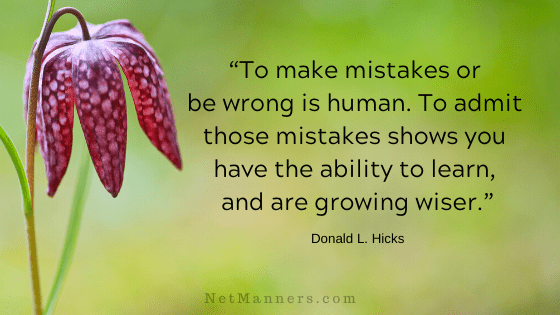How to Home School About Email Etiquette (and a Worksheet)

Pretty much everyone knows someone who was homeschooling before recent events. This is even more true now, with the school year ending early and fall being up in the air. If you homeschool or know someone who does, read on.
Several homeschooling Moms have contacted me recently. They are wondering if Email Etiquette should be part of their homeschooling efforts. Some are not too sure if their skills and knowledge are sufficient.
Here’s another…
What is Email Etiquette, and Why is it Important?
When you think of etiquette, you tend to think about manners, too, right?
Etiquette: the customary code of polite behavior in society or among members of a particular profession or group.
Manners: a person’s outward bearing or way of behaving toward others.
As we all know, habits formed during childhood are those we carry into our life experiences. To teach your children how to use technology appropriately, email etiquette, you are giving them a leg up.
The most effective communication methods avoid misunderstandings and consider others. That’s where email etiquette comes in.
Email Skills Open Doors
Whether it be teachers, coaches, friends, or parents, email skills can open the door to opportunities that otherwise may not have been apparent.
With that baseline set, why is email etiquette so important? Because how you use email will show what is important to you. For example:
Then and Now
Letters were a thing back in the day. Everyone knew how to write cursively and then took the time to craft letters detailing their experiences and emotions.
If you’ve read a letter from long ago, they told a story, and you would get drawn into the tale being told. You felt the importance of the author’s writings between the beautiful handwriting and the shared life experience.
Now that we have email, and most children are not taught cursive writing, that doesn’t mean we should no longer teach children how to communicate appropriately with the written word.
Email is different in that it is short and generally to the point. However, knowing how to communicate clearly with the written word is a skill that builds relationships and will be crucial to any future career your children may have.
Enter Discretion
Just as you would write a letter to your Mother differently than a business associate, the same goes for email. You should also consider how your email may impact the recipient.
Being less formal with friends and family makes sense. However, when emailing for business, there is no room for informality or muddled messaging. So when it comes to children, as with anything, forming good habits can benefit them in adulthood.
Teach by Doing
You can set up email addresses for your children to use to email you. This is learning by doing.
Start each day with a new topic. I created a convenient worksheet on the right that you can print and use.
Write the topic before each lesson. Then, have your children write down what they think they know and want to know.
After the lesson, you can have them finish the final column. This is where they confirm what they have learned.
Email Etiquette: 10-Day Home School Course
Set up a little curriculum where you communicate via email about a different topic each day. I’ve included links to other articles on this site for you to read up on and customize as you see fit.
Use the worksheet each day for the topic at hand. The topics below are the essentials, but you can break them down into smaller lessons or review my site and add additional lessons.
Have them email you about a subject of their choice. Look for a short, concise Subject, typos, a proper greeting and closing, and the perceived intent and tone.
From file size to image size and data allowance considerations.
This exercise will teach them how to protect contact privacy and set expectations.
Go through the steps for forwarding an email, including when to do so and the proper way of doing so. (Lesson #3 applies here, too.)
Generally speaking, 24-48 hours is recommended.
Send them an email where you pretend to be a “friend” that is mean or name calls, and have them respond appropriately. They will have to deal with this eventually; we all do. Having covered this in advance will help them to have perspective and respond appropriately.
Have your children email you a short email about a subject they would like to learn more about and why, incorporating previous lessons.
Have them email you about something they really want, including why they will be disappointed if they don’t get their way.
Each user is responsible for paying attention to details to protect their and others’ information. These tips are part and parcel of participation.
Throughout these lessons, it is crucial to emphasize the importance of proper sentence structure and grammar continually. Also, be sure to discuss how using formatting to reflect emotion is not a wise approach.
The Future is Bright
With remote working environments becoming mainstream, email skills will become even more critical for most jobs in the future. Give your children that running start now.
When your children grow up reflecting a command of the written word and the ability to use email properly, they will stand out from the rest. It’s a competitive world, and who wouldn’t want their child to be positioned to impress? Of course you do!








